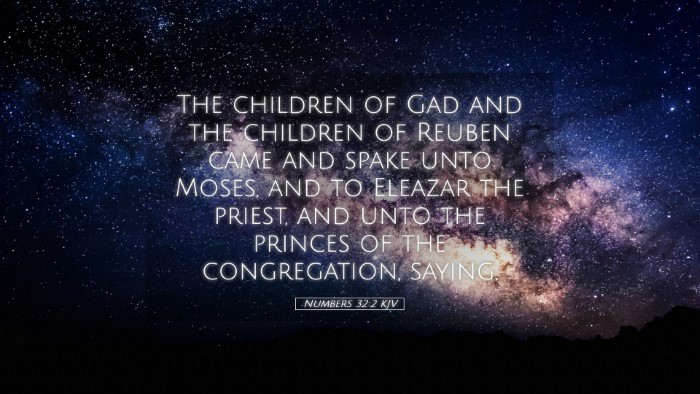Commentary on Numbers 32:2
Numbers 32:2 states: "The children of Reuben and the children of Gad came and spake unto Moses, and to Eleazar the priest, and unto the princes of the congregation, saying, The land which the Lord smote before the congregation of Israel, is a land for cattle, and thy servants have cattle."
Contextual Background
The request made by the tribes of Reuben and Gad must be understood in the context of Israel's journey through the wilderness towards the Promised Land. These tribes recognized the value of the land east of the Jordan River, which was suitable for grazing their livestock.
Insights from Matthew Henry
Matthew Henry emphasizes the spiritual implications of the request made by Reuben and Gad. He notes that their desire to settle outside the Promised Land was a reflection of a spiritual complacency. Henry warns against the danger of choosing present ease over future promise, highlighting that their request could symbolize a lack of faith in God's promises and the greater inheritance.
Insights from Albert Barnes
Albert Barnes provides an analysis of the geographical and militaristic factors in this pericope. He notes that the land was fertile and expansive, ideally suited for livestock, which was a vital aspect of their economy. Barnes highlights that the proposal by Reuben and Gad was practical but reflects a potential disunity within the Israelite camp, suggesting a need for harmony and collective purpose among the tribes.
Insights from Adam Clarke
Adam Clarke’s commentary brings attention to the covenantal aspect of Israel's land inheritance. Clarke points out that the Promised Land was meant to be a unified inheritance for all tribes, under God's sovereignty. He discusses the implications of Reuben and Gad’s request, emphasizing that while their desires were legitimate, they must align with God's overall plan for Israel. He warns that focusing on individual needs can lead to neglecting the communal covenant obligations to God.
Theological Themes
- Faith and Obedience: The hesitation of Reuben and Gad to fully enter the Promised Land raises crucial theological questions about the nature of faith. Are believers to be satisfied with partial obedience, or are they called to pursue the fullness of God’s promises?
- God’s Provision: The description of the land as good for cattle serves as a reminder of God’s provision. It suggests that while God provides for immediate needs, His plans often extend far beyond our present understanding.
- Community over Individualism: The unity of purpose among the tribes is a significant theme. The desire of Reuben and Gad serves as a caution against an isolated approach to faith that forgets the collective journey of God’s people.
Practical Applications for Pastors and Scholars
For pastors and scholars, Numbers 32:2 presents an opportunity to reflect on pivotal questions regarding faith, obedience, and community.
- Encouragement to Foster Unity: Churches should be urged to seek unity and collective purpose, reminding congregants that individual desires should not supersede the communal mission of the church.
- Teaching on God’s Promises: This passage can be used to teach about the richness of God’s promises and the importance of obedience to His will. Pastors can encourage their congregations to embrace the fullness of what God offers rather than settling for less.
- Reevaluation of Personal Goals: Scholars and theologians can explore the interplay between individual needs and divine calling, guiding future ministry practices to prioritize God’s overarching mission rather than personal agendas.
Conclusion
Numbers 32:2 serves not only as a historical account but also as a profound lesson in obedience, provision, and community. The insights from Matthew Henry, Albert Barnes, and Adam Clarke enrich the understanding of this scripture, highlighting the importance of aligning individual desires with God’s broader purpose for His people. It encourages a deeper examination of faithfulness in following God's plan rather than yielding to the allure of immediate gratification.


